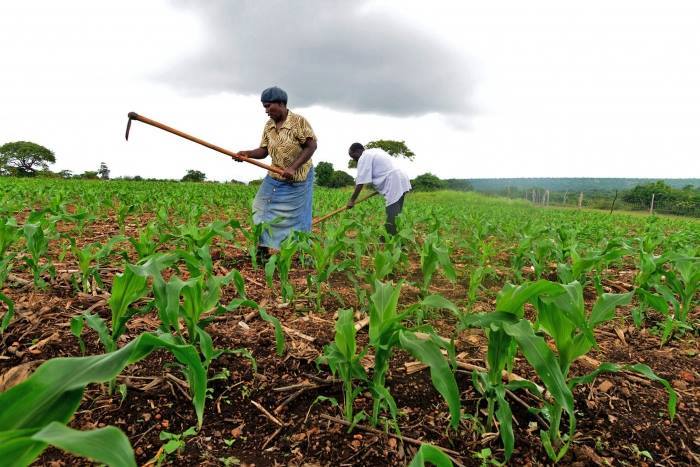 In a bid to curb the vagaries of weather in East Africa Resilient Africa Network has launched an innovation grant challenge targeting scholars and researchers to develop models and innovations geared towards fighting food insecurity through climate resilient approaches.
In a bid to curb the vagaries of weather in East Africa Resilient Africa Network has launched an innovation grant challenge targeting scholars and researchers to develop models and innovations geared towards fighting food insecurity through climate resilient approaches.
Resilient Africa Network (RAN) is one of the eight university-based Development Labs making up the Higher Education Solutions Network (HESN) established by the United States Agency for International Development (USAID) and existing within its Global Development. RAN’s grant challenge approach is based on the fact that the solutions to the current challenges can be tapped from the local people.
“We believe that the resilience of people and systems in Africa will be strengthened by leveraging the knowledge, scholarship and creativity that exists across the Resilient Africa Network to incubate, test, and scale innovations that target capabilities and reduce vulnerabilities identified by a scientific, data-driven, and evidenced-based resilience framework for sub-Saharan Africa,” noted RAN’s director of innovations Dr. Wanjiku Nganga.
Similar sentiments were echoed by Makerere University vice chancellor Professor Mondo Kagonyera who challenged researchers during the grant challenge launch to capitalize on it and offer sustainable solutions to most farmers who are suffering. “Let us not wait for other people or bodies to develop solutions to our challenges. We know and live with these challenges; consequently, we can develop best solutions to address them.
Upon reasonable development and testing, the innovations incubated by RAN shall be translated into ‘resilience interventions’ and scaled in representative target populations. RAN’s assumption is that the effects observed in the test populations can be replicated elsewhere.
The Round 1 Resilience Innovation Challenge is being hosted by the Eastern Africa RILab that is based at Makerere University School of Public Health, Uganda. Partner universities constituting the EA RILab include Makerere and Gulu Universities (Uganda), National University of Rwanda (Rwanda), the University of Kinshasa (DRC), and Muhimbili University of Health and Allied Sciences (Tanzania).
According to Dr. Wanjiku, within the countries hosting these institutions, RAN has identified seven communities where its core resilience challenges are highly prevalent, to facilitate the resilience building process. The seven communities include four communities in Uganda, two from Rwanda and one community from the DRC. She observed that the Eastern Africa region faces recurrent shocks and stresses arising from climate variability. Events are characterized by heavy destructive rains in some regions and insufficient rain in others, while some regions oscillate between both.
As a result of the poor climatic trend, the Eastern Africa RILab has conducted further exploration of these phenomena in four communities: Mt.Elgon, Albertine and Teso sub-regions in Uganda, and Northern and Western Rwanda. “Current evidence shows that average rainfall is increasing in the wetter regions and reducing in the drier ones with the immediate hazards arising out of these climate events including rapid and slow-onset floods in the low lying plains, landslides and in the event that either the rains or the droughts extend by a month beyond their anticipated duration, households may lose an entire crop,” explained Dr. Wanjiku.
In addition, the onset of rains has also become more erratic. “Among rural farmers, the narrow range of crops they grow is used for both household consumption and income generation, which combined with inexistent crop insurance, low financial inclusion, and low value addition to produce severe constrains in their livelihood safety nets, trapping them into a vicious cycle of low incomes and perennial poverty,”
These calamities emanating from climate change mainly affect the poor rural farmers hence the intensification of the search for permanent solutions one of which is the RAN challenge grant. Dr. Wanjiku Nnganga highlighted that this call focuses on the sourcing, developing, and scaling of transformative technologies and approaches that will strengthen resilience to shocks and stresses that arise from climate variability and climate change. “In particular, RAN is looking to catalyze and incentivize the development of solutions that will impact agricultural production and markets, as well as livelihood diversification and financial inclusion.
Grants ranging between US$15,000 to US$45,000 are anticipated under Phase 1 of this call.” Winners of Phase 1 Grants will then qualify to compete for Phase 2 grants which are anticipated to range between US$50,000 to US$100,000, while winners of Phase 2 grants may subsequently complete for Phase 3 awards which are anticipated to range between US$100,000 and US$ 200,000. The grants will support development of innovative approaches and technologies that will strengthen resilience to adverse climate effects arising from climate variability and climate change within the Eastern Africa region.
The grant challenge seeks to identify and fund about eight project teams addressing two of the categories of the challenge. The first category seeks solutions that can ‘shake-up’ the status quo on agricultural practices related to production and market interaction in a transformative way that multiplies yield and creates more farmer leverage in the markets.
The second category of the grant challenge seeks solutions that will substantially empower target communities by diversifying their livelihoods using simple but highly profitable farm and non-farm businesses, and solutions that create better financial inclusion for rural households through savings and access to credit
Teams will be selected based on the quality of their applications which will be evaluated to ascertain resilience building potential, potential for transformative impact, scalability, feasibility, and viability.
















Comments powered by CComment